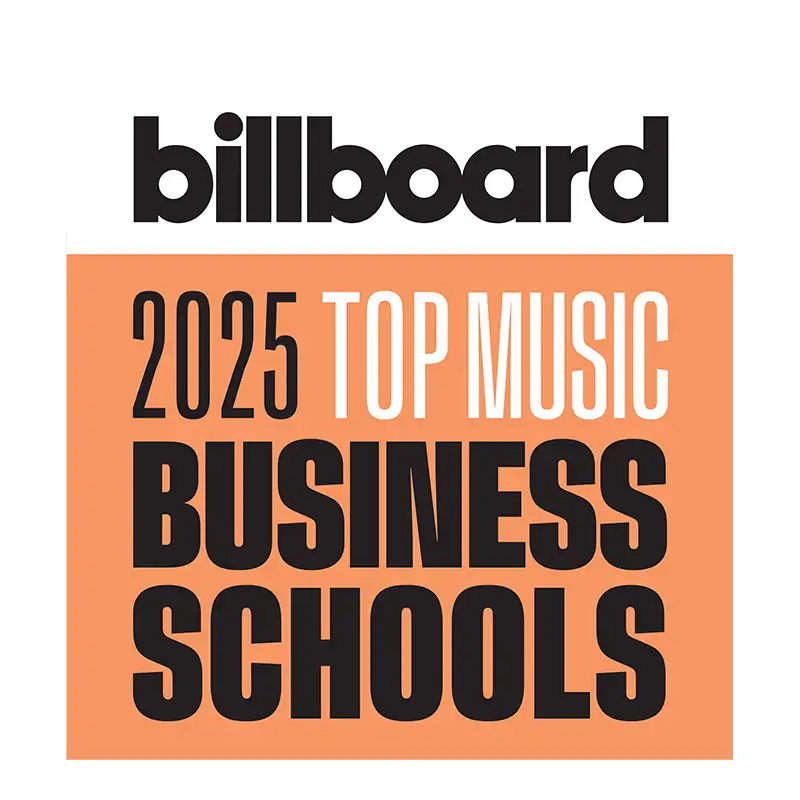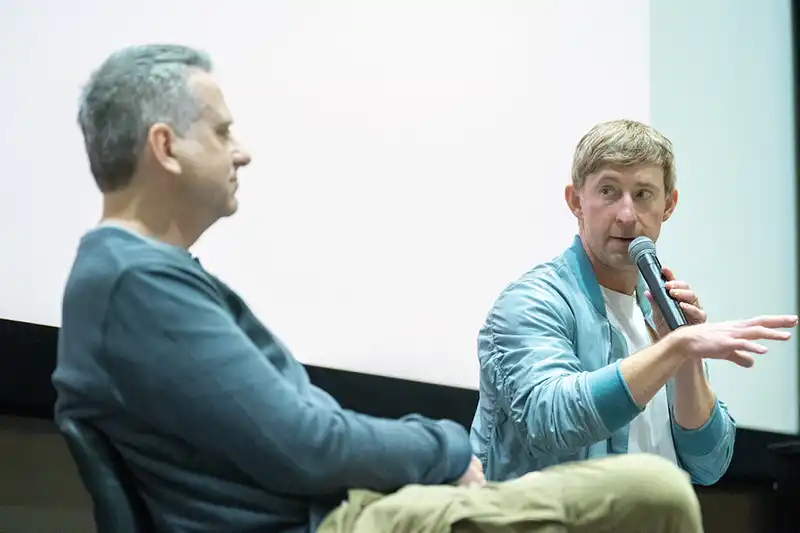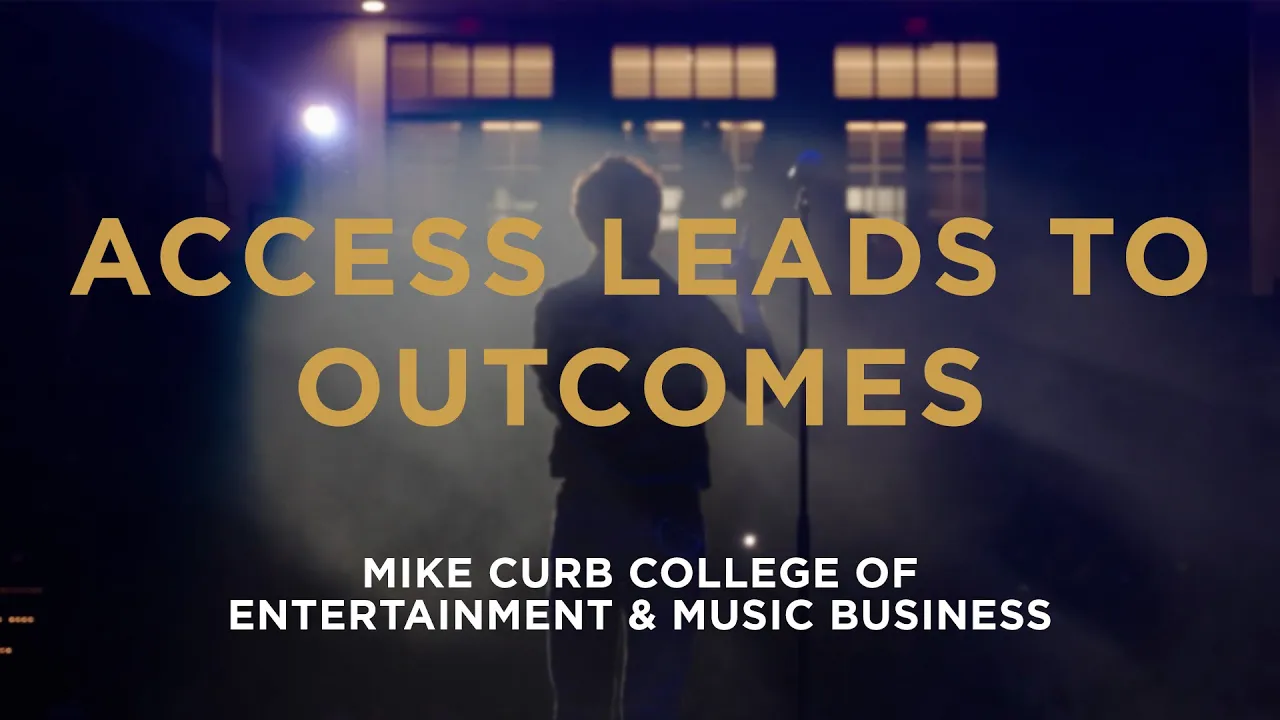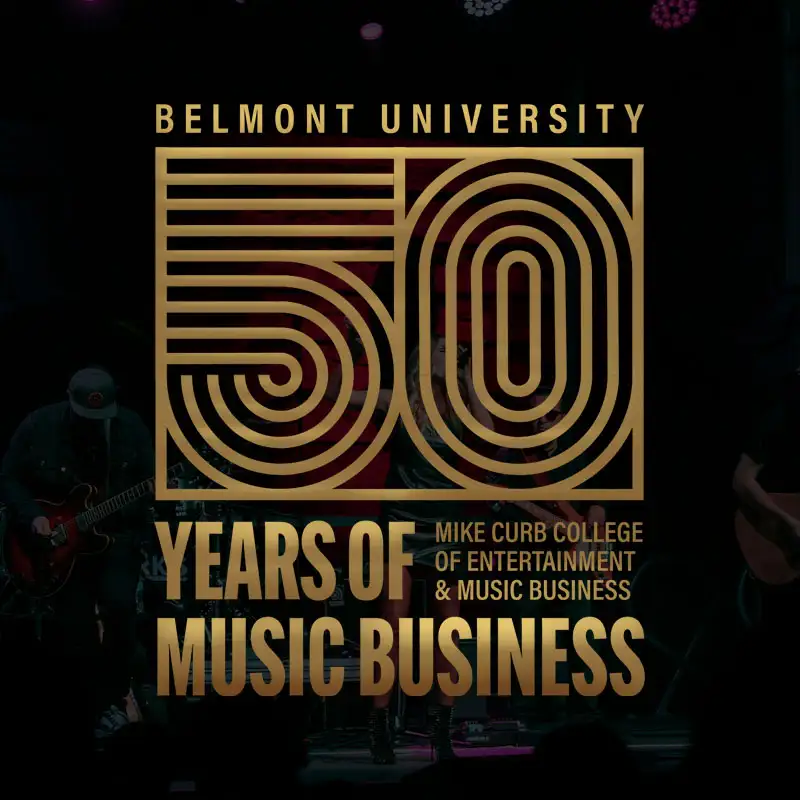Why Major in Music Business?

Belmont's pioneering Music Business program prepares future industry leaders for careers in the fast-changing music and entertainment world. Located in Nashville, Tennessee with study away programs across the country and around the globe, we put you close to all the opportunities you need to succeed!
According to Billboard Magazine, our program is a “feeder of industry leaders.” With a degree from Belmont, you’ll join many talented music business executives, artists, writers, managers, producers, touring leaders and musicians who graduated from Belmont and went on to shape the industry.
We are proud to be the only music business degree program in the world with AACSB International accreditation—a distinction that reflects the academic rigor and professional excellence of our curriculum. Combined with state-of-the-art facilities, expert faculty, extensive internships, and immersive industry experiences, Belmont is consistently recognized among Billboard’s “Top Music Business Schools” worldwide. With 50+ years of experience, our reputation speaks for itself.
No separate application required. Admission to the Music Business BBA program is included in Belmont's general undergraduate application—no audition or secondary process is needed.
Request Information
Music City USA and Beyond
Being one block from Nashville’s famous Music Row gives you easy access to today’s industry leaders through our alumni and strong connections. This city—and beyond—becomes your classroom. With a focus on hands-on learning, you’ll have a front-row seat to the music business, taking full advantage of Belmont’s long-standing relationships both inside and outside Nashville. The University’s Belmont USA program also lets you grow your cultural and career experiences in places like New York City, Los Angeles, Washington DC and across the globe.
We’ve built partnerships with some of the most important people and companies in the industry, like ASCAP, Big Machine, BMI, Brad Paisley & Kimberly Williams-Paisley, Creative Artists Agency, Morris Higham Management, the Music Business Association, the Music Licensing Collective, Ryman Hospitality Properties, Sony Music Publishing, TriStar Sports and Entertainment, Universal Music Group, Warner Music Group, Wide Eyed Entertainment, William Morris/Endeavor, and many more.
At Belmont, you’ll build a community that forms the foundation of your professional network. From helping backstage with acclaimed Service Corps student org on events like the Grammy Awards, CMA Fest and Sundance Film Festival to Belmont's own Showcase Series where students plan and run arena concerts, you’ll develop the real-world skills employers crave. Innovative programs like Belmont East in New York City and Belmont at Bonnaroo give you even more chances to grow within a strong, supportive community—both in and out of the classroom.
What You'll Learn

Business Courses That Power Creative Careers
As a music business major, you'll learn the key business principles that drive today’s entertainment world. You’ll take classes such as survey of music business, copyright law, live events and music publishing—alongside courses in business management, accounting and marketing that prepare you to lead or manage companies in the entertainment industry.
You can also explore courses in music marketing, venue management, music streaming, social and emotional wellbeing, Jay-Z and the business of hip hop, music supervision, the artist’s team, touring, public relations, working in a booking agency and more.
Depending on your career interests, you can choose from several emphases:
- Business
- Legal
- Legal 3+3
- Live
- Production
Program Details
Program Requirements
- BELL core requirements: 50 hours (minimum)
- Business courses: 39 hours
- Music Business Major area: 17 hours (Survey of Music Business, Career and Professional Development, Copyright Law, Understanding the Live Economy, Music Publishing, Label Operations, Senior Capstone)
- Music Business Emphasis area: 15-21 hours
- General electives: 10-11 hours (minimum)
Program Summary
As a music business management major, you'll take classes that combine business and music industry training. The degree is similar to earning a double major in business and music business, so you don't need a minor. You'll learn how the industry works and how to manage people, projects and creative ideas.
Courses cover topics like music business opeartions, copyright law, marketing, venue management, publishing, touring and entrepreneurship. You'll also take business management classes in accounting, finance, leadership and strategy that prepare you to run a label, manage a team or start your own company. Internships and real-world projects are built in, giving you experience and connections before you graduate.
Emphasis Areas
- Business
The Business Emphasis uniquely combines a professional business degree (B.B.A.) with a broad and flexible selection of electives, allowing students to tailor their studies to personal career goals within the music and entertainment industries. Students integrate core business fundamentals with specialized coursework in evolving areas such as digital and social media marketing, genre-specific industry studies (including hip-hop, blues, and the evolution of recorded music), DIY and entrepreneurial ventures, film and music supervision, and the international music business. This emphasis is ideal for students aspiring to lead, manage, or launch businesses across the global music and entertainment landscape. - Legal
The Legal Emphasis focuses on the legal and policy frameworks that shape the music and entertainment industries. Coursework examines entertainment law, copyright, contracts, and artists’ rights, along with contemporary legislative and regulatory developments impacting the field. This emphasis is well suited for students seeking a strong foundation in how creative work is protected, negotiated, and governed by law, as well as for those planning to pursue graduate studies such as law school. - Legal 3+3
The 3+3 Program offers an accelerated and distinctive pathway for highly motivated students to earn both a Bachelor of Business Administration (B.B.A.) in Music Business and a Juris Doctor (J.D.) degree in six (6) years. Through a collaborative partnership with the Music Business Department and College of Law, qualified students begin their first year of law school during what would traditionally be their senior year of undergraduate study. Designed for students seeking careers at the intersection of entertainment, law, policy, advocacy, and business leadership, the program intentionally integrates music business education with rigorous legal training. - Live
The Live Emphasis prepares students for careers in the live entertainment economy by combining focused instruction with hands-on application. Students examine the key players, processes, and business models involved in concerts, touring, festivals, venue management, and event promotion. This emphasis equips students with practical knowledge and industry insight essential to succeeding in live music and event-based careers. - Production
The Production Emphasis blends creativity and business by exploring how music is created, produced, and brought to market. Students study music production, publishing, studio practices, and collaborative workflows with artists and producers. This emphasis develops the technical, creative, and professional skills needed to work effectively at the intersection of artistry, technology, and the music business.
3+3 for Music Business into Belmont Law
This 3+3 Program (B.B.A. to J.D.) connects the music business to the legal profession giving students to opportunity to earn a B.B.A and Juris Doctor degree in six years to, among other things, save tuition costs. Through this unique arrangement with the Belmont College of Law, this 3+3 program allows students to begin their first year of law school during their fourth year of undergraduate study (by completing their B.B.A. in Music Business, Legal Studies Emphasis).
This program is designed to allow qualified students, if accepted through application to Belmont’s College of Law, who complete the undergraduate requirements in Music Business/Legal Studies Emphasis B.B.A (including the BELL Core [general education]), the ability to matriculate to Belmont College of Law. Upon successful completion of the first year of law school (with at least 29 earned LAW hours), the student will earn their undergraduate degree (B.B.A), and, upon completion of the College of Law’s degree requirements in the College of Law, will earn the Juris Doctor (J.D.) degree.
Accelerated MBA (AMBA)
Students in the Music Business Management major may pursue Belmont’s Accelerated MBA (AMBA) program after completing their undergraduate degree. This program enables students to earn both a Bachelor of Business Administration and a Master of Business Administration in an accelerated timeframe—often in as little as five years total. The AMBA pathway builds advanced expertise in management, finance, and leadership for students preparing for high-level careers in the music and entertainment industries.
Learn More About the Accelerated MBA
Master of Arts in Media & Entertainment Industries (MAMEI)
Take your business and creative expertise to the next level with Belmont’s Master of Arts in Media & Entertainment Industries. This advanced degree explores entertainment strategy, digital media management and global industry leadership—ideal for graduates pursuing senior positions in labels, publishing, streaming or live event management or a career teaching. Music Business majors are uniquely prepared to transition seamlessly into the MAMEI program.
Beyond the classroom, you’ll have a wealth of opportunities to explore the business of music, make connections and discover your purpose.
- Gain insights from industry leaders like record-breaking songwriter Ashley Gorley, NY TImes best-selling author Alice Randall, artists like Kelsea Ballerini, Brad Paisley, Amy Grant, Tiera Kennedy and so many more, whether in our classrooms as guest speakers, at our seminar series or with them as interns.
- Study away and abroad through our programs in NYC, LA, Atlanta, DC and across the world in England, Ireland, South Korea, Australia and more. Programs range from a few weeks away to a semester.
- Intern with one of our industry partners in Nashville, Los Angeles, New York or beyond.
- Connect with classmates and gain hands-on industry experience by joining one of more than 20 clubs and organizations devoted to the music and entertainment industry – such as Service Corps, CMA EDU, GRAMMY U, and Women in Entertainment.
- Receive hands-on experience working at events like the Grammy Awards, Sundance Film Festival, CMA Awards and many more.
 Belmont University’s B.B.A. programs are accredited by the Association to Advance Collegiate Schools of Business (AACSB), the premier agency for bachelor’s, master’s and doctoral degree programs in business administration and accounting.
Belmont University’s B.B.A. programs are accredited by the Association to Advance Collegiate Schools of Business (AACSB), the premier agency for bachelor’s, master’s and doctoral degree programs in business administration and accounting.
Fewer than 5% of business schools worldwide achieve AACSB accreditation, and Belmont is the only private college or university in Tennessee that is accredited by AACSB International for BBA, MBA and accounting programs. Belmont’s program is the only AACSB-accredited music business in the world.
Outcomes & Alumni Success

Belmont has a large group of successful alumni, including artists and songwriters like Ashley Gorley, Tyler Hubbard, Gordon Kennedy, Hillary Lindsey, Brad Paisley, Tricia Yearwood, and Hailey Whitters. Industry leaders like Rusty Gaston (Sony Music Publishing Nashville President), Clint Higham (Morris Higham), Dann Huff (producer/guitarist for Kane Brown and Keith Urban), Cindy Mabe (Chair and CEO of Universal Music Group Nashville), Ben Vaughn (Warner Chappell Nashville President/CEO) and Carla Wallace (co-founder of Big Yellow Dog Music) are also part of our alumni. You’ll learn from these professionals through internships, seminars, and classroom guest speakers!
We're committed to your success
Curb College's Professional Development team helps students and graduates grow their skills and networks, preparing them to enter the entertainment industry. To support this, our team offers one-on-one meetings, weekly workshops led by industry experts, off-campus networking events, and hundreds of internships each semester. We serve as ambassadors and connectors for Curb College students and graduates through active involvement in the entertainment world.
It's no wonder that 98% percent of Curb College graduates are employed, pursuing continuing education, or enlisted in the military within 6 months of graduation and 89% of employed graduates are in positions that align with their short or long term career goals.
Alumni Testimonials
Career Possibilities
Whether you love music from the creator’s perspective or love the business of music, the opportunities you have by holding a Bachelor of Business Administration are never-ending. Here are just a few of the careers you’ll be equipped to pursue:
- Artist
- Artist Manager
- Attorney
- Audio Engineer
- Booking Agent
- Concert Promoter
- Music Publisher
- Music Streaming
- Producer
- Social Media
- Songwriter
- Tour Management
Learn from Industry Experts
Our accomplished faculty represent the best of the best. They are experts in what they teach as each of them has worked in the music and entertainment field – as record label executives, publishing company leaders, artists and performers, entertainment lawyers, to concert promoters, marketing/social media experts, venue owners and so much more. They share their expertise through their gift of storytelling!
Contact Us
Mike Curb College of Entertainment & Music Business
Emily Reynolds
Admissions Coordinator
615.460.6453
Email Emily


























